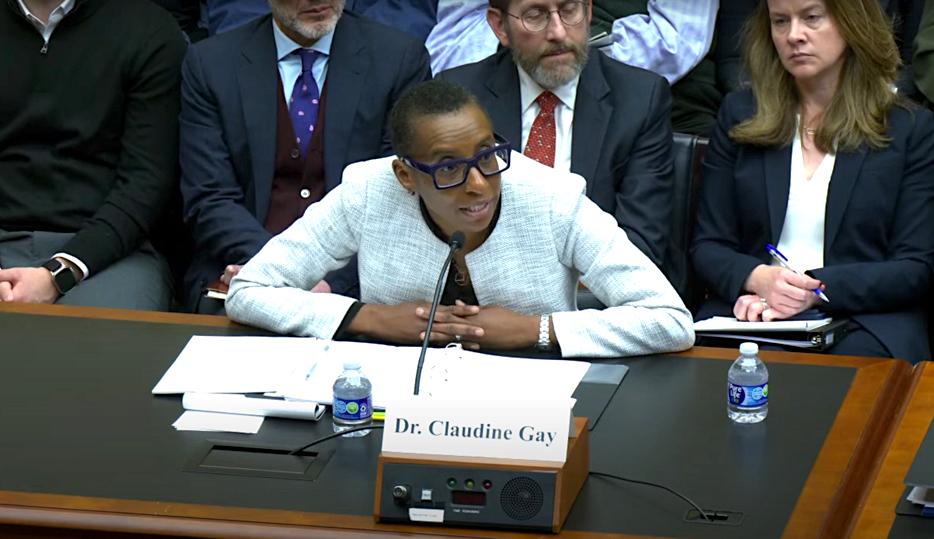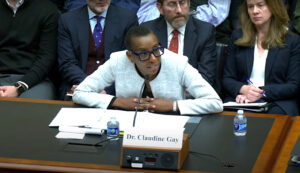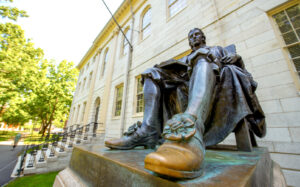Harvard submits 8-page whitewash of plagiarism investigation of former president to House Committee
Harvard submitted an eight-page summary of its investigation into plagiarism accusations against former university president Claudine Gay to the House Committee on Education and the Workforce this…

Harvard submitted an eight-page summary of its investigation into plagiarism accusations against former university president Claudine Gay to the House Committee on Education and the Workforce this week.
Gay resigned on Jan. 4 amid the cheating allegations, but she is still keeping her $900,000 per year salary and a faculty position at Harvard.
The new document submitted to Congress said that Harvard appointed an independent review panel that largely found the original allegations by the New York Post of plagiarism by Gay were “meritless.”
The report found just three instances “that did not adhere to the College Guide” on citations and academic integrity.
Unsurprisingly, the self-serving Ivy League panel “determined that then-President Gay’s conduct was not reckless nor intentional and, therefore, did not constitute research misconduct as defined by [Harvard].”
But the instances of copying do fit the definition of plagiarism, according to experts consulted by CNN.
Even the Harvard Crimson admitted as much.
The only open question, said CNN and the Crimson, was “how and whether she [Gay] should have been punished.”
In the letter to Congress, Harvard says the committee’s investigation included “three publications by then-President Gay implicated by [the Post’s] allegations” and “eleven works alleged to be plagiarized.”
But the Post details 27 separate incidences “in which Gay’s words appeared to closely parallel words, phrases or sentences in published works by other academics.”
The Post first contacted Harvard about the allegations on Oct. 24, which led to the university appointing a panel on Nov. 3 to investigate, according to the Harvard report.
Notably missing from report is the 15-page letter sent to the Post on Oct. 27 by Thomas Clare, a high-powered Virginia-based attorney with the firm Clare-Locke.
Clare, at that time, identified himself as defamation counsel for Harvard University and Gay.
The Post said Harvard defends the alleged plagiarism that pre-dated the appointment of the Harvard panel, which was supposed to independently look into the allegations.
The implication was that Harvard would take legal action against the Post if it published the plagiarism allegations against Gay.
“The Independent Panel observed that there was ‘no doubt’ that the articles ‘are both
sophisticated and original,’ and that there was ‘virtually no evidence of intentional claiming of
findings that are not President Gay’s,’” said the Harvard report submitted to Congress.
Gay, 54, was the first woman and the first black person to serve as president of Harvard.
She was also the shortest-serving president in the university’s history.
The university under Gay’s leadership was roiled by accusations of antisemitism and a leaky diversity, equity and inclusion (DEI) scheme that is rocking academia for its emphasis on identity over merit.
“The issues are not limited to antisemitism or DEI,” said House Education Committee Chairwoman Rep. Virginia Foxx, R-North Carolina. “The issue isn’t even Harvard itself. It is the political and bureaucratic elements of the whole of academia that subvert the university mission of pursuing truth. In that regard, Gay was the worst offender.”
Foxx has vowed to expand the committee’s probes into the failures of higher education exemplified by Gay’s leadership and academia’s self-serving mission of pursuing something other than truth.


